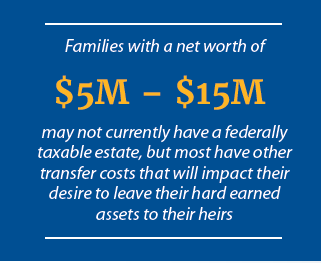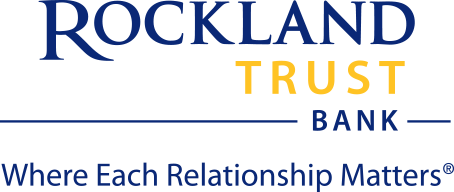While integrating insurance into your comprehensive financial plan is very important, doing so and forgetting about it can be problematic. As your needs change over time, it is important to review your full financial picture including insurance policies to determine if they are meeting your expectations and financial objectives.

For example, a family progresses through life and accumulates a size-able estate, their insurance needs don’t go away, rather their objectives change over time. During the accumulation phase of life - saving money in a retirement plan, creating equity in real estate, prudently funding investment accounts, and/or building value in a business – it makes sense to purchase insurance for income replacement purposes so the family can maintain their standard of living in case an income earner dies prematurely. However, as they reach retirement age and can “self-insure”, new planning needs surface, legacy planning and transfer costs. If you are interested in passing down a portion of your wealth to your children or grandchildren, it’s important to note that families with a net worth of $5,000,000 to $15,000,000 may not currently have a federally taxable estate, but most have other transfer costs that will impact their desire to leave their hard earned assets to their heirs. Things like long term care costs, income taxes due on retirement plan assets upon death, and Massachusetts Death/Estate Tax can significantly reduce the amount of money left for their legacy. This provides even more reason to make sure you are reviewing your policies and setting you and your family up for success.
Rockland Trust Investment Management Group’s Advanced Insurance Specialist, Jack Gates alongside Financial Planning Officer, Terry Becker recently sat down with a client who sold their business and wanted to understand if they were financially secure enough to retire. With goals of retiring in the near term and leaving a legacy for their children, our team uncovered a solution that required changes to their plan and insurance policies to better fit their current needs and objectives.
Our client was a married couple who had $2,000,000 in a retirement plan, their primary home was valued at $1,000,000, a summer home valued at $550,000, and various bank and investment accounts that totaled $1,500,000. The makeup of this estate was going to result in a Massachusetts Estate Tax of roughly $350,000 and an income tax on the retirement plan assets of about $650,000, for a total transfer cost of around $1,000,000. The client had cash value life insurance policies totaling about $1,000,000 with roughly $200,000 of cash value, and premium payments remaining of about $10,000 for the next 15 years. We determined given the stage of life they were in, they had accumulated enough retirement assets to live comfortably for the rest of their lives and the life insurance proceeds from their individual plans were not needed should one of the spouses die. As discussed above, this review uncovered their insurance objectives had changed - from income replacement to legacy planning. We determined the best course of action was to use the cash value in their existing policies to purchase a $1,000,000 Second to Die Life policy with no additional payments required, which ultimately saved them those $10,000 per year premium payments for the next 15 years. The Second to Die Life policy was purchased in an Irrevocable Life Insurance Trust with the cash value as a gift to the trust. The life insurance proceeds will now be enough to cover the transfer costs of Massachusetts death taxes and income tax on their retirement assets.
Outcomes such as this are client specific and illustrate the importance of reviewing ones financial life in totality and not just once, but over time as life changes. No two plans are alike. Our team of professionals execute these types of reviews and often uncover something in our client’s plans that need to be adjusted to better suit them given their life stage or situation. Not only do we leave them more financially secure and properly prepared for their future, but they also gain a better appreciation and understanding of the planning process.
Not Insured by FDIC or Any Other Government Agency / Not Rockland Trust Guaranteed /
Not Rockland Trust Deposits or Obligations / May Lose Value





